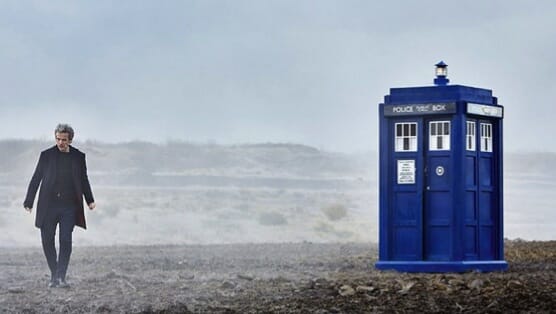Doctor Who: “The Magician’s Apprentice”
(Episode 9.01)

“If someone who knew the future pointed out a child to you and told you that that child would grow up totally evil, to be a ruthless dictator who would destroy millions of lives, could you then kill that child?”
These words are spoken by Tom Baker’s Fourth Doctor in Genesis of the Daleks, a much-celebrated 1975 arc in which The Doctor, Sarah Jane Smith and Harry Sullivan are sent to the war-torn planet of Skaro in order to derail the chain of events which will lead to the titular genesis of the Daleks, those screeching death machines that have served as Doctor Who’s most iconic villains for its entire 50-year run. At the point in the episode where this speech occurs, the Time Lord finds himself in position to complete this task. By merely touching two wires together, he boasts the ability to wipe out the Daleks and subsequently save the lives of generations of innocent beings who will be caught in their warpath. But, he wonders, does he have the right to play God? Considering The Doctor’s intense sense of morality, the answer is ultimately “no,” but it’s not a stretch to theorize that there have been subsequent times when he has regretted taking the high road.
Incidentally, the clip of this Genesis monologue is played halfway through
“The Magician’s Apprentice” and for good reason—the whole episode’s conceit centers on one inalienable fact: The Doctor decides not to save someone who he knows will cause immeasurable harm. On initial blush, the being in question looks to be a scared young boy trapped on a battlefield and surrounded by ominous hands ready to pull him to his death. Unfortunately, in this case, this helpless soul will later become the maniacal Davros, a mad scientist whose experiments will culminate in the creation of the Daleks. The Doctor’s decision to abandon the boy upon learning his name raises a serious question—would Davros still have become the Davros we know if The Doctor had rescued him, or did he become a monster precisely because some mysterious man gave him hope for rescue only to then abandon him to die? Because Doctor Who has always played a bit loose with its time travel rules, there’s a bit of a chicken-or-an-egg style to this line of questioning. Nevertheless, given that The Doctor ponders aloud about how “how scared must you be to seal every one of your own kind inside a tank?” it’s a question Moffat and Co. want us to be asking. “If Davros made the Daleks, who made Davros?” he continues, knowing that the answer might hit closer to home than he cares to admit.
Following the encounter between The Doctor and the young Davros, we find a hooded figure named Sariff searching for The Doctor on behalf of an ailing Davros. “Davros remembers,” he repeats, a refrain that seems to chill The Doctor to the bone. Meanwhile, we meet Clara Oswald back on modern-day Earth. Whilst in the middle of a school lesson, she notices that an airplane has stopped in the middle of the sky. Sure enough, all around the world, thousands of planes have done the exact same—as if they were frozen in time. UNIT quickly intervenes and the culprit is soon revealed to be Missy, apparently very much alive after the events of “Death in Heaven.” The Time Lady informs Clara she’s lost contact with The Doctor and she fears for his safety. What’s more, she comes equipped with a confessional device that The Doctor has entrusted her with. Its contents can only be revealed at the time of his death, which—based on his behavior—might very well be soon. Lest we think she’s grown soft, however, Missy quickly re-affirms her bloodlust by disintegrating several UNIT guards on a whim. Michelle Gomez is an absolute joy here, and I’m very thankful we didn’t have to wait several years to again witness Missy’s personalized brand of psychotic glee.
On another note, the existence of the confessional device sets up a very familiar Steven Moffat trope: the notion that the season is leading towards The Doctor’s demise. The fifth season saw him being erased from existence, the sixth season had him investigating his seemingly inevitable assassination and the seventh found him traveling towards his final resting place in Trenzalore. At this point, the convention has become a bit rote, but the episode benefits from this aspect being merely one cog of a very complex plot machine.
-

-

-

-

-

-

-

-

-

-

-

-

-

-

-

-

-

-

-

-

-

-

-

-

-

-

-

-

-

-

-

-

-

-

-

-

-

-

-

-








































